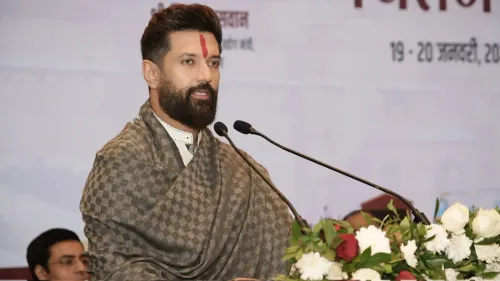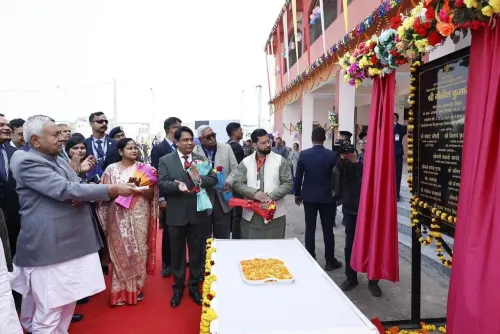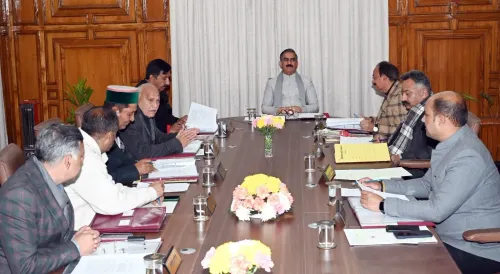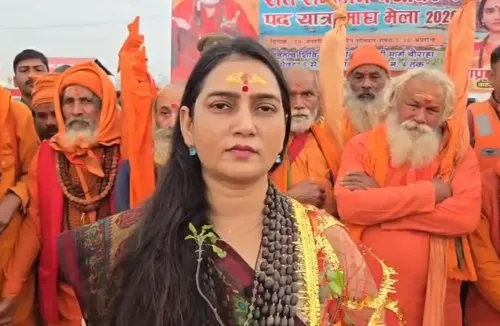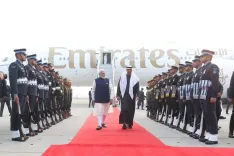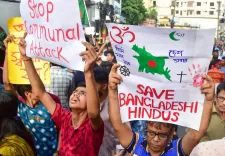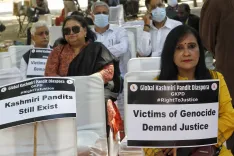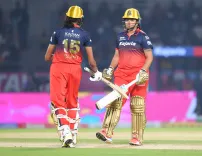PM Modi Demonstrates India's Steadfast Commitment to Peace and Progress in the Muslim World: Diplomats
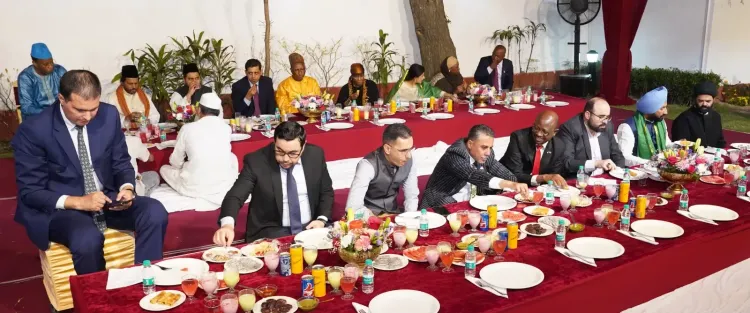
Synopsis
Key Takeaways
- Significant Iftar gathering for Muslim ambassadors in India.
- PM Modi's leadership strengthens ties with Muslim-majority nations.
- India promotes peace and stability in global Muslim conflicts.
- Commitment to humanitarian aid and dialogue in Palestine and Afghanistan.
- Unity and brotherhood emphasized during Ramzan celebrations.
New Delhi, March 27 (NationPress) In honor of the sacred month of Ramzan, the Indian Minorities Federation (IMF) organized the 'Sadbhavana Iftar' gathering for the ambassadors representing 19 Muslim nations in India, taking place at the residence of Rajya Sabha MP and IMF Convener, Satnam Singh Sandhu, in the capital.
The Iftar event welcomed ambassadors and diplomats from 19 nations, alongside Islamic scholars, clerics, religious leaders, intellectuals, writers, and poets.
Attendees included ambassadors from Somalia, Afghanistan, Syria, Gambia, Mali, Bangladesh, Sudan, Algeria, Malawi, Cameroon, Chad, Guinea, Iraq, Cote D'Ivoire, Tanzania, Nigeria, as well as cultural representatives from Iran and the UAE.
Among the notable guests were social reformer and Shia cleric, Maulana Syed Kalbe Rushaid Rizvi; Haji Syed Salman Chishty, Chairman of Chishty Foundation; and co-founder of IMF, Himani Sood.
Before breaking their fast, attendees united in prayer for peace, harmony, and prosperity within India and globally.
This gathering served as a platform for ambassadors from Islamic nations in India to unite in the spirit of brotherhood and solidarity during Ramzan.
During the occasion, Muslim ambassadors acknowledged that India has longstanding historical, economic, and strategic connections with the Islamic world, which have flourished in the past decade under Prime Minister Narendra Modi's leadership.
They expressed that PM Modi has augmented relations with Muslim-majority nations across South Asia, Central Asia, and the Middle East, bolstering India's security and economy.
The ambassadors emphasized that PM Modi's outreach to the Islamic world, particularly the Arab nations, has elevated India's centuries-old trade, cultural, and civilizational bonds with Muslim-majority countries over the last ten years.
They noted that India’s engagement with the Gulf region, which provides over 60% of India's crude oil and has bilateral trade with the Organisation of Islamic Cooperation (OIC) nations surpassing $200 billion, has become increasingly robust and diversified under PM Modi’s guidance.
As an international statesman, PM Modi has imparted a new direction to India's strategic and economic connections with the Islamic world, resulting in enhanced security, trade, and cultural partnerships with Muslim-majority countries that have honored him with their highest civilian decorations.
According to the ambassadors, under PM Modi's stewardship, India has consistently positioned itself as a staunch advocate for peace, stability, and dialogue in global conflicts affecting the Muslim world, including those in Palestine and Afghanistan.
They added that India endorses a two-state solution for Palestine and has actively provided humanitarian assistance to Gaza.
In Afghanistan, India has played a constructive role by investing in essential infrastructure, education, and healthcare to enhance the living conditions of the Afghan populace.
Muslim ambassadors noted that India has refrained from military aggression against any Muslim-majority nation, consistently advocating for peaceful diplomacy in its foreign relations.
As a founding member of the Non-Aligned Movement (NAM), India has historically resisted colonialism and foreign interference in Muslim-majority areas, reinforcing its dedication to nurturing peace and cooperation globally.
Expressing gratitude for the honor of hosting the Iftar-e-Daawat for the Muslim community during the auspicious month of Ramzan, MP Satnam Singh Sandhu remarked, "Ramzan symbolizes not just a religious observance; it is a moment for reflection, generosity, and community unity—principles that India holds dear. India has always been a multi-cultural, multi-ethnic, and multi-religious society, where every faith has coexisted in harmony for generations. PM Modi has further reinforced this spirit of oneness and fraternity over the past decade through his 'Sabka Saath, Sabka Vikas' ethos, representing India's inclusive identity."
Ambassadors from Muslim nations stated that the entire country is collectively striving to fulfill the vision of 'Viksit Bharat' under PM Modi's strong leadership.
Sudan's Education Counselor Mohamed Ali Fazari said, "India is championing the cause of the Global South alongside other developing and developed nations. India has emerged as a leading nation globally in aiding many countries. The ties between India and African nations have strengthened over the years, particularly during the Covid-19 pandemic when India provided substantial assistance."
Edson Moyo, Zimbabwe's Plenipotentiary Minister, remarked, "India and Zimbabwe share robust bilateral relations. India has consistently supported Zimbabwe. We have prioritized economic diplomacy and continued to advance together. The rapid progress in artificial intelligence in India is noteworthy. India stands as the fastest-growing nation, capable of facilitating technology transfer. Learning from India's social and IT sectors is vital for us. We are eager to explore the UPI payment system in India, which simplifies transactions without the need for cash. We aim to implement a similar system in our country."
Mustapha Jawara, the High Commissioner of Gambia, stated, "During Covid-19, India provided Gambia with vaccines, saving numerous lives. We are thankful to PM Modi and his administration for that support."
When asked about PM Modi's mantra of 'Sabka Saath, Sabka Vikas', Jawara affirmed, "He is the leader of the Global South. PM Modi is truly exceptional. We in the Global South admire him, especially for his role in G20, where he has ensured that Africa is represented. We are grateful for his advocacy on our behalf at various levels."
On the topic of peaceful coexistence among communities in India, Jawara said, "India exemplifies how a diverse society can thrive, being the second-largest Muslim nation. As a Muslim, I have been welcomed to attend events hosted by non-Muslims, which reflects this harmony."
Regarding India's role as a peacemaker, Jawara remarked: "India under PM Modi has demonstrated leadership in this area. Thanks to India, global peace has been preserved. Without India and PM Modi, the Russia-Ukraine conflict could have escalated further."
Fariduddin Faridasr, Cultural Counsellor of Iran, noted, "The commonality between India and Iran lies in the fact that the Prime Ministers of both nations are deeply rooted in their culture, heritage, and values. India and Iran have historically maintained strong bilateral relations, and this will continue to grow. Due to the shared beliefs of our leaders, the partnership between India and Iran will be fortified. The supremacy of law is fundamental to secularism, and India embodies this unique strength, allowing it to progress further by respecting and embracing people from all communities equally.


